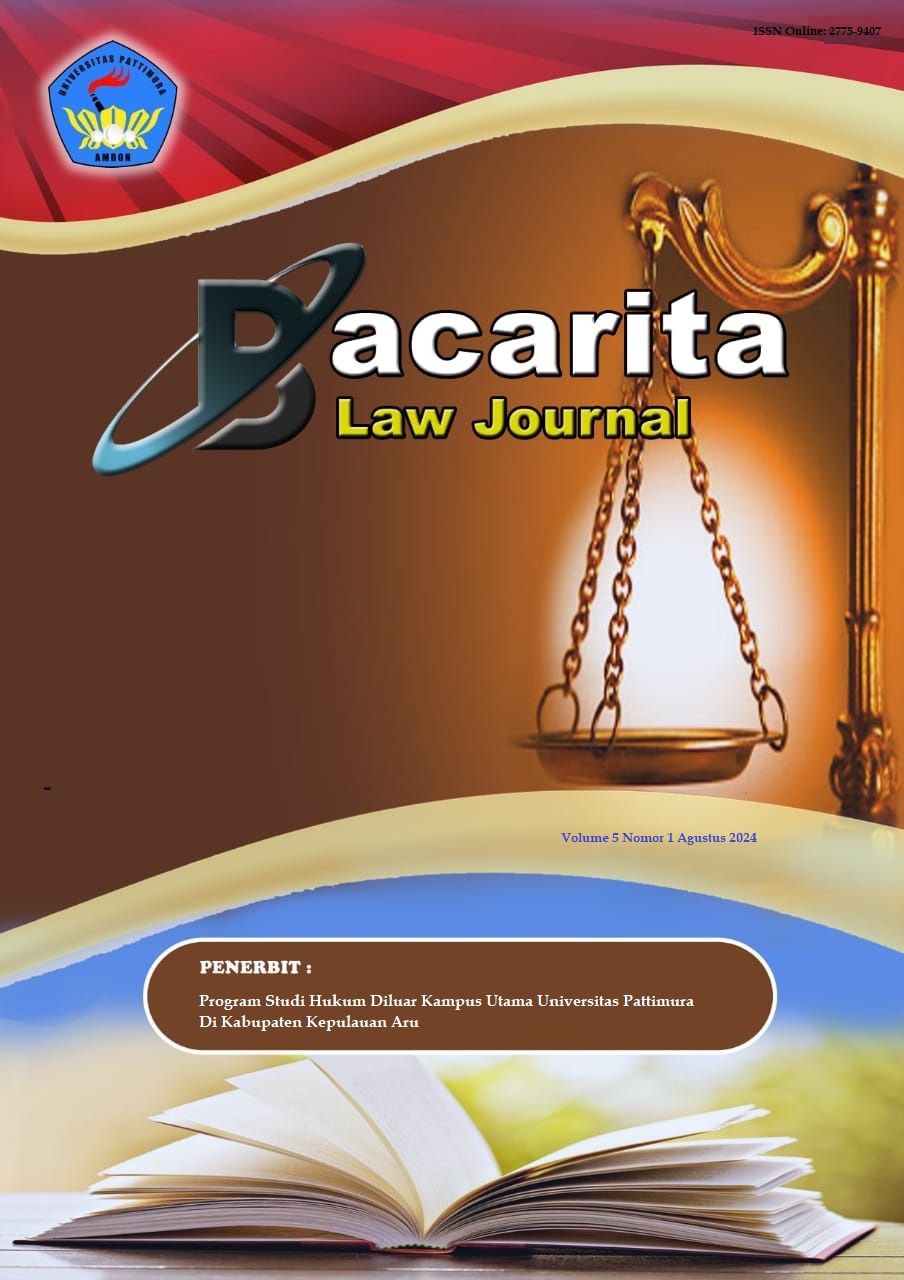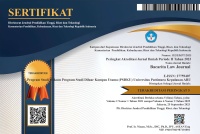Pembentukan Lembaga Kerja Sama Bipartit Pasca Berlakunya Penetapan Peraturan Presiden Pengganti Undang-Undang Cipta Kerja Menjadi Undang-Undang
Abstract
The passage of the Presidential Regulation in Lieu of the Law on Job Creation as outlined in Law Number 6 of 2023, the Bipartite Cooperation Institution was formed. This paper examines the legal elements behind the establishment of the Bipartite Cooperation Institute. The Bipartite Cooperation Institute functions as a forum for communication between employers and workers in an organization with the aim of fostering positive working relationships, but there are obstacles in the implementation of Article 190 of the Manpower Law because there are no technical provisions regarding administrative sanctions for business actors who are not members of the Bipartite Cooperation Institution. Primary and secondary legal sources are analyzed using normative legal techniques. The results of the study show that changes in regulations in the Job Creation Law cause legal uncertainty related to the establishment and implementation of Bipartite Cooperation Institutions. Although the establishment of a Bipartite Cooperation Institute is mandatory for companies with more than 50 workers, the administrative sanctions regulated have not been effectively implemented. As a result, many companies do not comply with these obligations, thus hindering efforts to create productive and conducive industrial relations. This study recommends the need for clear technical arrangements regarding sanctions enforcement mechanisms, more massive socialization, and increased active participation of employers and workers, so that the Bipartite Cooperation Institution can function optimally in preventing industrial conflicts and supporting sustainable employment development.
Downloads
References
Auliya Rahmania, “Urgensi Pengaturan Sanksi Bagi Perusahaan Yang Tidak Mela ksanakan Corporate Social Responsibility,” Unes Law Review 6, no. 2 (2023): 4780–88, https://review- unes.com/index.php/law/article/view/1305.
Dinas Ketenagakerjaan Balikpapan. LKS Bipartit Solusi Tepat untuk Kemajuan Perusahaan dan Peningkatan Kesejahteraan Pekerja/Buruh, 2024 https://disnaker.balikpapan.go.id/web/detail/pengumuman/36/lks-bipartit-solusi-tepat-untuk-kemajuan-perusahaan-dan-peningkatan-kesejahteraan-pekerjaburuh.
Effendy, E. E., & Evan, E. (2024). Analisis Penerapan Hukum Dalam Pembentukan Lembaga Kerjasama Bipartit: Tinjauan Terhadap Kekosongan Hukum Pra Dan Pasca Peraturan Pemerintah Pengganti Undang-Undang Nomor 2 Tahun 2022 Tentang Cipta Kerja. Unes Law Review, 6(3), 9307–9318. Doi : https://doi.org/10.31933/unesrev.v6i3.
Harahap, A. M. Pengantar Hukum Ketenagakerjaan. Malang: Literasi Nusantara, 2020.
Kasno, Gatot Dwi Hendro Wibowo, and Chrisdianto Eko Purnomo, “Pengenaan Sanksi Administrasi Bidang Telekomunikasi Pasca UU Cipta Kerja,” Jatiswara 39, no. 1 (2024): 26–44, doi: https://doi.org/10.29303/jtsw.v39i1.604.
Maha, M. A. R., & Harahap, A. M. (2023). Analisis Peraturan Pemerintah Pengganti Undang-Undang Nomor 2 Tahun 2022 Tentang Cipta Kerja Terkait Ketentuan Waktu Istirahat Bagi Pekerja/Buruh. Jurnal EDUCATIO: Jurnal Pendidikan Indonesia, 9(1), 346–352. Doi : https://doi.org/10.29210/1202322949.
Peter Mahmud Marzuki, Penelitian Hukum, Jakarta: Kencana, 2005.
Putra, D. K., & Nusantara, A. G. (2020). Efektivitas Lembaga Kerja Sama Bipartit dalam Penyelesaian Perselisihan Hubungan Industrial. Jurnal Hukum Ius Quia Iustum, 27(1), 192-210. Doi : https://doi.org/10.56259/jwi.v1i1.17.
Siswanto, W., Adityaningrum, N., & Purnomowati, R. D. (2023). Pelembagaan Lks Bipartit Di Tingkat Perusahaan Sebagai Mekanisme Upaya Pencegahan Perselisihan Hubungan Industrial Di Tempat Kerja. Jurnal Multidisiplin Indonesia, 2(8), 1922–1931. doi: https://doi.org/10.58344/jmi.v2i8.386.
Soerjono Soekanto and Sri Mamudji, Penelitian Hukum Normatif: Suatu Tinjauan Singkat, Jakarta: Raja Grafindo Persada, 2003.
Copyright (c) 2025 Raul Maulid Azriyal, Rio Arif Pratama, Surahman Surahman

This work is licensed under a Creative Commons Attribution-NonCommercial 4.0 International License.
Authors who publish their manuscripts in this Journal agree to the following conditions:
- The copyright in each article belongs to the author, as well as the right to patent.
- Authors are able to enter into separate, additional contractual arrangements for the non-exclusive distribution of the journal's published version of the work (e.g., post it to an institutional repository or publish it in a book), with an acknowledgment of its initial publication in this journal.
- Authors are permitted and encouraged to post their work online (e.g., in institutional repositories or on their website) prior to and during the submission process, as it can lead to productive exchanges, as well as earlier and greater citation of published work.
- Authors have the right to self-archiving of the article (Author Self-Archiving Policy)















